 Petzlover
Petzlover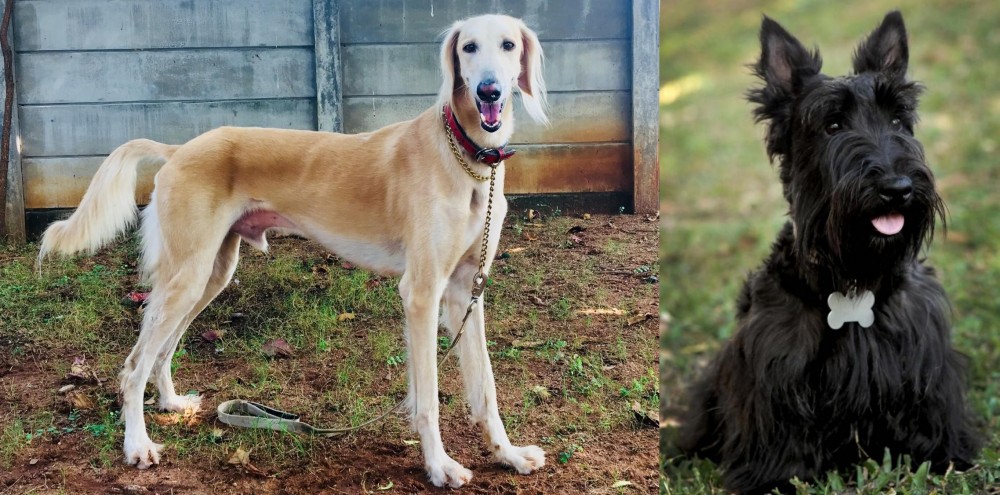 Saluki is originated from Iraq but Scoland Terrier is originated from United Kingdom. Saluki may grow 44 cm / 18 inches higher than Scoland Terrier. Saluki may weigh 20 kg / 45 pounds more than Scoland Terrier. Both Saluki and Scoland Terrier has almost same life span. Both Saluki and Scoland Terrier has same litter size. Saluki requires Moderate Maintenance. But Scoland Terrier requires High Maintenance
Saluki is originated from Iraq but Scoland Terrier is originated from United Kingdom. Saluki may grow 44 cm / 18 inches higher than Scoland Terrier. Saluki may weigh 20 kg / 45 pounds more than Scoland Terrier. Both Saluki and Scoland Terrier has almost same life span. Both Saluki and Scoland Terrier has same litter size. Saluki requires Moderate Maintenance. But Scoland Terrier requires High Maintenance
 It seems as though the Saluki's origins go far back to ancient Egypt times. The dog is known for its superb hunting abilities.
It seems as though the Saluki's origins go far back to ancient Egypt times. The dog is known for its superb hunting abilities.
These dogs have been known in the Middle East and could be found in Iran and Egypt too. Breeding with other dogs was forbidden so the Saluki has remained unchanged for thousands of years.
It has always been known over the centuries for its superb grace and speed as well as endurance. He is capable of that because of the tall, sleek, muscular body and long, narrow head.
The Saluki came to England in the 1900s, and today the dog comes in quite a few variations.
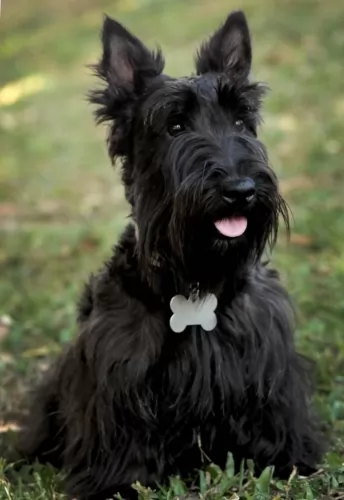 Not much is known about the Scoland Terrier. It is not a purebred but rather a crossbreed developed by crossing the Scottish Terrier with the Westland Terrier. To understand these mixed breeds, look to the original breeds for any combination of the characteristics of the breeds. The offspring of this crossing is not a 50-50 split of the original breeds looks or temperament.
Not much is known about the Scoland Terrier. It is not a purebred but rather a crossbreed developed by crossing the Scottish Terrier with the Westland Terrier. To understand these mixed breeds, look to the original breeds for any combination of the characteristics of the breeds. The offspring of this crossing is not a 50-50 split of the original breeds looks or temperament.
Because the Scoland Terrier is a mix between the Scottie and the Westie he has all the characteristics of a typical terrier perhaps even twice as much. With both parents being terriers, you can expect your Scoland to act like a short legged terrier. These dogs are known for their courage and tenacity. Today these terriers are family companions. Most terriers today come from a pool of ancestral dog in the 19th century in Europe. This information was gleaned from a genetic analysis done in 2006.
The Scoland Terrier, being a hybrid, is not acknowledged by the American Kennel Club (AKC) or the United Kennel Club (UKC). It is acknowledged by the International Designer Canine Registry (IDCR), American Canine Hybrid Club (ACHC), Dog Registry of America, Inc. (DRA), Designer Dogs Kennel Club (DDKC) and Designer Breed Registry (DBR).
 The Saluki is a graceful, elegant looking dog, deep chested and long legged, much like the Greyhound and fairly closely related to the Afghan Hound.
The Saluki is a graceful, elegant looking dog, deep chested and long legged, much like the Greyhound and fairly closely related to the Afghan Hound.
They stand at between 58 and 71cm and weigh between 16 to 29kg. The head is long and narrow, the eyes large and the dog has floppy ears. The tail is long and curved. The coat of the Saluki comes in a number of different colours and these can be fawn, cream, white, tan, some black or it can have a blend of all these colours. The coat of this dog comes in two types - smooth and the feathered type. The fur is always beautifully silky and is considered to be low-shedding.
These dogs are also very fast runners, and if you check the Guinness Book of Records, you’ll see that the Saluki is listed there as being one of the fastest dogs with tremendous stamina.
Th Saluki is a beautiful, quiet, dignified, reserved, loyal dog. You can just see that he is intelligent. He is certainly affectionate with his human family but you wouldn’t call him demonstrative. He isn’t the kind of dog to be wildly prancing around wagging his tail furiously.
He’s the kind of dog that likes to give chase so you’ll need a large garden for him. It’s why he isn’t suited for city life on a small property. The countryside is a far better option for this tall dog.
When he’s not outdoors, he can easily curl up on your sofa for a few hours of utter relaxation. Training and socialization will be necessary for this shy dog as it not only makes him obedient, but it gives him some confidence with knowing how to behave in different circumstances. He’ll get on well with older children, but is fairly indifferent and intolerant to small kids, especially those that are undisciplined and left to climb over him.
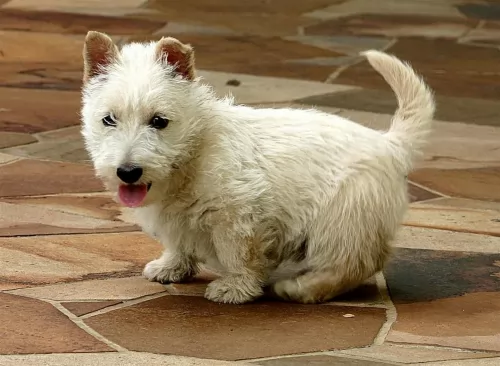 Being a hybrid, the Scoland Terrier will not always look alike and could look like a Scottie, a Westie or a combination of the two. Most breeders of this designer dog say it usually has a body like the Scottie and a round head like the Westie. They are more often black with white markings, but they can often be wheaten as well. With round dark eyes, a scissors bite and black nose, her face is unique. The breed has erect and small, triangular ears and a medium fluffy tale. The coat is hard and wiry, with a dense soft undercoat.
Being a hybrid, the Scoland Terrier will not always look alike and could look like a Scottie, a Westie or a combination of the two. Most breeders of this designer dog say it usually has a body like the Scottie and a round head like the Westie. They are more often black with white markings, but they can often be wheaten as well. With round dark eyes, a scissors bite and black nose, her face is unique. The breed has erect and small, triangular ears and a medium fluffy tale. The coat is hard and wiry, with a dense soft undercoat.
 The Saluki loves his human family, and he’s the kind of dog that wouldn’t like to be owned by one family ad then given away to another later on. That's why make sure when you get your Saluki your intentions are to keep him.
The Saluki loves his human family, and he’s the kind of dog that wouldn’t like to be owned by one family ad then given away to another later on. That's why make sure when you get your Saluki your intentions are to keep him.
He likes to be comfortable too when they’re not running outside, and a good bed is important to him. Salukis are naturally thin, so make sure not to overfeed him. These are quiet, calm dogs, but over the centuries they've been making reliable, steadfast pets and companions.
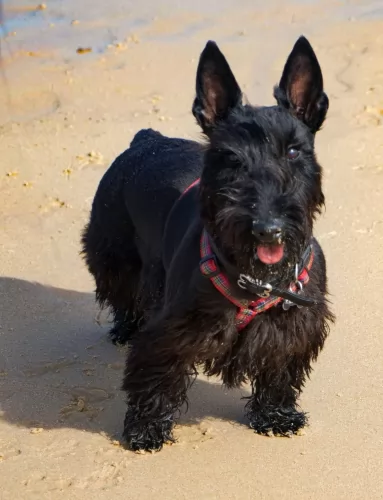 1.Children friendliness - they can be very good with children and children can help them get their exercise.
1.Children friendliness - they can be very good with children and children can help them get their exercise.
3.Adaptability - yes but she is adept at digging and must have a safe enclosure.
 We always mention hip dysplasia as a common dog ailment as so many dog breeds can succumb to this ailment. With the Saluki, hip dysplasia is uncommon. Cancer and cardiac issues are more prevalent with these dogs.
We always mention hip dysplasia as a common dog ailment as so many dog breeds can succumb to this ailment. With the Saluki, hip dysplasia is uncommon. Cancer and cardiac issues are more prevalent with these dogs.
It is sad to realize that dogs are susceptible to the same types of cancer as people are. If the uncontrolled growth of cells in the body isn’t discovered in time, cancer can reach the circulatory or lymph systems and other parts of the body. In fact, cancer is the leading cause of death with dogs. The good news is that it is treatable if you catch it in the early stages.
One of the more common types of cancer in dogs is Lymphoma. This can affect any dog, and at any age too. There are swollen lymph nodes under the neck and the dog can have trouble with breathing and digestion. You’ll notice lumps underneath the dog's skin, abnormal discharges from the eyes, ears or rectum, non-healing wounds, coughing and pain.
 This hybrid dog can inherit any of the issues faced by its two parent breeds. For the Scoland Terrier this can include:
This hybrid dog can inherit any of the issues faced by its two parent breeds. For the Scoland Terrier this can include:
• Seborrhea – Skin disease that can cause dogs to scratch until bleeding and/or infected.
• Carniomandibular Osteopathy -called lion’s jaw this is a developmental disease that causes extensive changes in the bones of the mandible and skull.
• Pulmonic Stenosis – when the blood flowing from the heart’s right ventricul to the pulmonary artery is blocked.
• PPM or Persistent Pupillary Membranes - causes visual impairment when the membranes do not dissolve after birth.
• Chronic Hepatitis – disease of the liver that can eventually cause major damage.
 These tall, slender dogs love to run free and it's the kind of dog that will need regular and different forms of exercise.
These tall, slender dogs love to run free and it's the kind of dog that will need regular and different forms of exercise.
Provide your Saluki with a comfortable, warm, dry bed with lots of padding.
The Saluki has smooth, silky hair so brush it twice a week to keep it gleaming.
To help your Saluki have a strong immune system, he needs the best food there is. Good food packed with vitamins and minerals instead of preservative and colorants will help him fight diseases like cancer.
Commercially manufactured dog foods can be wonderfully convenient and nutritious if you get the better quality ones. Give him some home-made food too and add it twice a week to the dry kibble. This will provide variety and a tasty treat. Boiled chicken, brown rice, sweet potatoes, carrots and spinach are simple foods – just like dogs want.
Try and include some raw meat occasionally. Fresh, cool water should always be available around the clock.
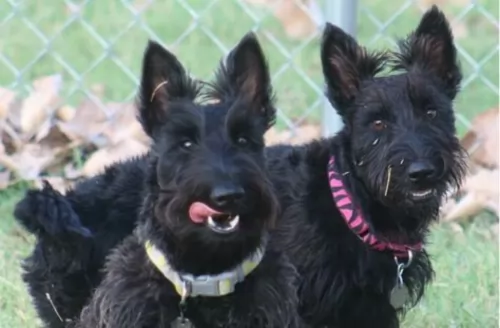 1.Feeding the puppy - Give a high quality puppy dog food designed for terriers or active medium sized dogs. Give ¾ of a cup over 3 meals a day.
1.Feeding the puppy - Give a high quality puppy dog food designed for terriers or active medium sized dogs. Give ¾ of a cup over 3 meals a day.
2.Feeding the adult – Give a high quality adult dog food designed for terriers or active medium sized dogs. Give one cup over two meals a day.
4. Games and Exercises – The Scoland Terrier is a very active dog and needs daily exercise, He need time to play, run, and be stimulated by games. She would be very good at flyball, Frisbee, fetch, agility, barn hunt, and obedience. He needs at least 2 hours of play and exercise everyday.